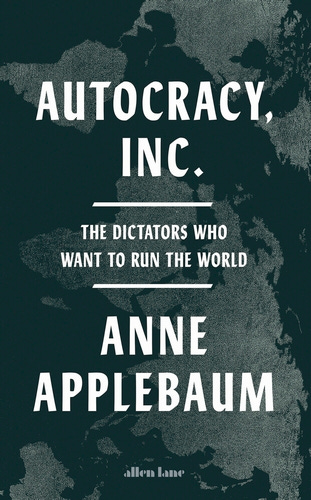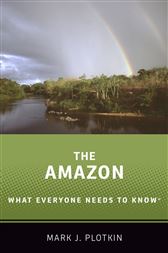Anne Applebaum
Presentation of her book: Autocracy, Inc: The Dictators Who Want to Rule the World
Five weeks from now, my new book will be published: Autocracy, Inc: The Dictators Who Want to Rule the World. It’s a short book, an argument, really, about the way the world now works. I think of it as the opening of a discussion rather than a definitive statement. At the center of the book is a network (not an axis, alliance or bloc) of dictatorships: Russia, China, Iran, Venezuela, Syria, Cuba, Belarus, Myanmar, Zimbabwe, North Korea plus a dozen-odd others who are seeking to change the international system in order to keep their regimes in power and to preserve their leaders’ wealth. They are not united ideologically. They do not meet either openly or secretly to make policy. They have many conflicts with one another.
The only thing that bring them together is their dislike of the democratic world, whose language and ideals are a threat to their form of power. The book focuses on the things they have in common: kleptocracy, information war tactics, diplomatic and military collaboration and a common approach to dissent.
For a deeper, pre-publication dive - this is the introduction:
All of us have in our minds a cartoon image of an autocratic state. There is a bad man at the top. He controls the army and the police. The army and the police threaten the people with violence. There are evil collaborators, and maybe some brave dissidents. But in the twenty-first century, that cartoon bears little resemblance to reality.
Nowadays, autocracies are run not by one bad guy but by sophisticated networks relying on kleptocratic financial structures, a complex of security services— military, paramilitary, police—and technological experts who provide surveillance, propaganda, and disinformation. The members of these networks are connected not only to one another within a given autocracy but also to networks in other autocratic countries, and sometimes in democracies too. Corrupt, state-controlled companies in one dictatorship do business with corrupt, state-controlled companies in another. The police in one country may arm, equip, and train the police in many others. The propagandists share resources—the troll farms and media networks that promote one dictator’s propaganda can also be used to promote another’s—as well as themes: the degeneracy of democracy, the stability of autocracy, the evil of America.
This is not to say that there is some secret room where bad guys meet, as in a James Bond movie. Nor is our conflict with them a black-and-white, binary contest, a “Cold War 2.0.” Among modern autocrats are people who call themselves communists, monarchists, nationalists, and theocrats. Their regimes have different historical roots, different goals, different aesthetics. Chinese communism and Russian nationalism differ not only from each other but from Venezuela’s Bolivarian socialism, North Korea’s Juche, or the Shia radicalism of the Islamic Republic of Iran. All of them differ from the Arab monarchies and others—Saudi Arabia, the Emirates, Vietnam—which mostly don’t seek to undermine the democratic world. They also differ from the softer autocracies and hybrid democracies, sometimes called illiberal democracies—Turkey, Singapore, India, the Philippines, Hungary—which sometimes align with the democratic world and sometimes don’t.
Unlike military or political alliances from other times and places, this group operates not like a bloc but rather like an agglomeration of companies, bound not by ideology but rather by a ruthless, single-minded determination to preserve their personal wealth and power: Autocracy, Inc. Instead of ideas, the strongmen who lead Russia, China, Iran, North Korea, Venezuela, Nicaragua, Angola, Myanmar, Cuba, Syria, Zimbabwe, Mali, Belarus, Sudan, Azerbaijan, and perhaps three dozen others share a determination to deprive their citizens of any real influence or public voice, to push back against all forms of transparency or accountability, and to repress anyone, at home or abroad, who challenges them.
They also share a brutally pragmatic approach to wealth. Unlike the fascist and communist leaders of the past, who had party machines behind them and did not showcase their greed, the leaders of Autocracy, Inc., often maintain opulent residences and structure much of their collaboration as for-profit ventures. Their bonds with one another, and with their friends in the democratic world, are cemented not through ideals but through deals—deals designed to take the edge off sanctions, to exchange surveillance technology, to help one another get rich.
Autocracy, Inc., also collaborates to keep its members in power. Alexander Lukashenko’s unpopular regime in Belarus has been criticized by multiple international bodies—the European Union, the Organization for Security and Cooperation in Europe—and shunned by its European neighbors. Many Belarusian goods cannot be sold in the United States or the EU. The national airline, Belavia, cannot fly to European countries.
And yet, in practice, Belarus is not isolated at all. More than two dozen Chinese companies have invested money in Belarus, even building a China-Belarus Industrial Park, modeled on a similar project in Suzhou. Iran and Belarus exchanged high-level diplomatic visits in 2023. Cuban officials have expressed solidarity with Lukashenko at the UN. Russia offers markets, cross-border investment, political support, and probably police and security services too. In 2020, when Belarusian journalists rebelled and refused to report a false election result, Russia sent Russian journalists to replace them. In return, Belarus’s regime has allowed Russia to base troops and weapons on its territory and to use those assets to attack Ukraine.
Venezuela is also, in theory, an international pariah. Since 2008, the United States, Canada, and the European Union have ramped up sanctions on Venezuela in response to the regime’s brutality, drug smuggling, and links to international crime. Yet President Nicolás Maduro’s regime receives loans from Russia, which also invests in Venezuela’s oil industry, as does Iran. A Belarusian company assembles tractors in Venezuela. Turkey facilitates the illicit Venezuelan gold trade. Cuba has long provided security advisers and security technology to its counterparts in Caracas. Chinese-made water cannons, tear-gas canisters, and shields were used to crush street protesters in Caracas in 2014 and again in 2017, leaving more than seventy dead, while Chinese-designed surveillance technology is used to monitor the public too. Meanwhile, the international narcotics trade keeps individual members of the regime, along with their entourages and families, well supplied with Versace and Chanel.
The Belarusian and Venezuelan dictators are widely despised within their own countries. Both would lose free elections, if such elections were ever held. Both have powerful opponents: the Belarusian and the Venezuelan opposition movements have been led by a range of charismatic leaders and dedicated grassroots activists who have inspired their fellow citizens to take risks, to work for change, to come out onto the streets in protest. In August 2020, more than a million Belarusians, out of a population of only ten million, protested in the streets against stolen elections. Hundreds of thousands of Venezuelans repeatedly participated in protests across the country too. If their only enemies had been the corrupt, bankrupt Venezuelan regime or the brutal, ugly Belarusian regime, these protest movements might have won.
But they were not fighting autocrats only at home; they were fighting autocrats around the world who control state companies in multiple countries and who can use them to make investment decisions worth billions of dollars. They were fighting regimes that can buy security cameras from China or bots from St. Petersburg. Above all, they were fighting against rulers who long ago hardened themselves to the feelings and opinions of their countrymen, as well as the feelings and opinions of everybody else. Autocracy, Inc., offers its members not only money and security but also something less tangible: impunity.
The conviction, common among the most committed autocrats, that the outside world cannot touch them—that the views of other nations don’t matter and that no court of public opinion will ever judge them—is relatively recent. Once upon a time the leaders of the Soviet Union, the most powerful autocracy in the second half of the twentieth century, cared deeply about how they were perceived around the world. They vigorously promoted the superiority of their political system, and they objected when it was criticized. They at least paid lip service to the aspirational system of norms and treaties set up after World War II, with its language about universal human rights, the laws of war, and the rule of law more generally. When the Soviet premier Nikita Khrushchev stood up in the United Nations and banged his shoe on the table, as he famously did in the General Assembly in 1960, it was because a Filipino delegate said that Soviet-occupied Eastern Europe had been “deprived of political and civil rights” and “swallowed up by the Soviet Union.” Khrushchev felt it was important to object.
Even in the early part of this century, most dictatorships hid their true intentions behind elaborate, carefully manipulated performances of democracy. Today, the members of Autocracy, Inc., no longer care if they or their countries are criticized or by whom. Some, like the leaders of Myanmar and Zimbabwe, don’t stand for anything beyond self-enrichment and the desire to remain in power, and so can’t be embarrassed. The leaders of Iran confidently discount the views of Western infidels. The leaders of Cuba and Venezuela treat criticism from abroad as evidence of the vast imperial plot organized against them. The leaders of China and Russia have spent a decade disputing the human rights language long used by international institutions, successfully convincing many around the world that the treaties and conventions on war and genocide—and concepts such as “civil liberties” and “the rule of law”—embody Western ideas that don’t apply to them.


